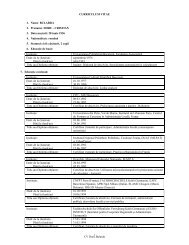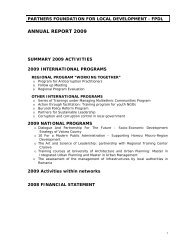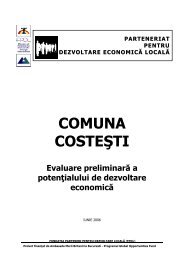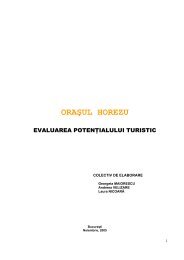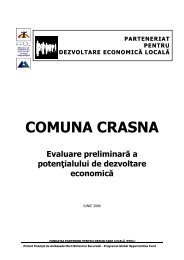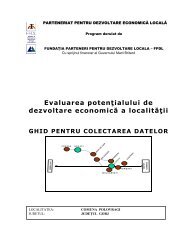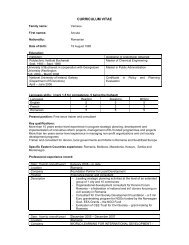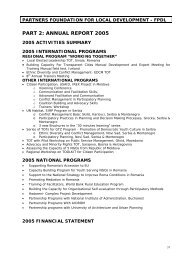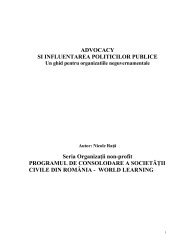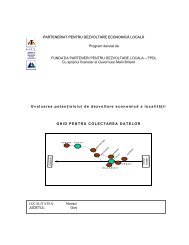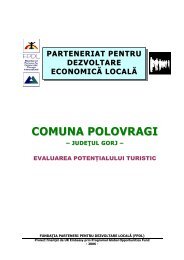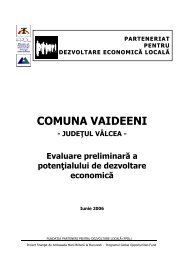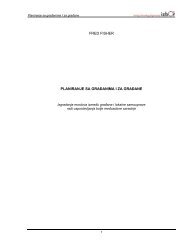Organizational Development: A Manual for Managers and ... - FPDL
Organizational Development: A Manual for Managers and ... - FPDL
Organizational Development: A Manual for Managers and ... - FPDL
You also want an ePaper? Increase the reach of your titles
YUMPU automatically turns print PDFs into web optimized ePapers that Google loves.
In 1995, Ikujiro Nonaka <strong>and</strong> Hirotaka Takeuchi published their great book, “The Knowledge-<br />
Creating Company”. In this book, they contend that Japanese companies have become successful<br />
because of their skills <strong>and</strong> expertise at ‘organizational knowledge creation’, which is based on the<br />
initiative of the individual <strong>and</strong> the interaction that takes place within the group. It was stressed that<br />
teams play a central role in the knowledge-creation process since they provide a shared context in<br />
which individuals can interact with each other.<br />
Authors of the book classify human knowledge into two kinds. “One is explicit knowledge, which<br />
can be articulated in <strong>for</strong>mal language including grammatical statements, mathematical<br />
expressions, specifications, manuals, <strong>and</strong> so <strong>for</strong>th. This kind of knowledge thus can be transmitted<br />
across individuals <strong>for</strong>mally <strong>and</strong> easily. This has been the dominant mode of knowledge in the<br />
Western philosophical tradition. However, we shall argue, a more important kind of knowledge is<br />
tacit knowledge, which is hard to articulate in <strong>for</strong>mal language. It is personal knowledge embedded<br />
in individual experience <strong>and</strong> involves intangible factors such as personal belief, perspective, <strong>and</strong><br />
the value system. Tacit knowledge has been overlooked as a critical component of collective<br />
human behaviour.” The ‘Japanese intellectual tradition’ played a crucial role in developing tacit<br />
knowledge - distinguished by the ‘oneness’ of humanity <strong>and</strong> nature, of body <strong>and</strong> mind, <strong>and</strong> of self<br />
<strong>and</strong> other.<br />
Nonaka <strong>and</strong> Takeuchi see the primarily role of any organization in the organizational knowledgecreation<br />
process as providing the proper context <strong>for</strong> facilitating group activities, as well as creating<br />
<strong>and</strong> accumulating knowledge at the individual level. They discuss five conditions required at the<br />
organizational level to promote the knowledge spiral:<br />
• Intention (an organization’s aspiration toward its goals);<br />
• Autonomy (is the organization allows autonomous action at the individual level);<br />
• Fluctuation <strong>and</strong> Creative Chaos (‘breakdown’ of routines, habits, or cognitive frameworks);<br />
• Redundancy (existence of in<strong>for</strong>mation that goes beyond the immediate operational<br />
requirements); <strong>and</strong><br />
• Requisite Variety (that must match the variety <strong>and</strong> complexity of the environment <strong>and</strong> can<br />
be enhanced by combining in<strong>for</strong>mation differently, flexibly, <strong>and</strong> quickly, <strong>and</strong> by providing<br />
equal access to in<strong>for</strong>mation throughout the organization).”<br />
They developed the ‘Five-Phase Model of the <strong>Organizational</strong> Knowledge Creation Process’:<br />
• Sharing Tacit Knowledge (“the individuals’ emotions, feelings, <strong>and</strong> mental models have to<br />
be shared to build mutual trust”);<br />
• Creating Concepts (“once a shared mental model is <strong>for</strong>med in a field of interaction, the<br />
self-organizing team then articulates it through further continuous dialog, …[until] it is<br />
verbalized into words <strong>and</strong> phrases, <strong>and</strong> finally crystallized into an explicit concept”);<br />
132



